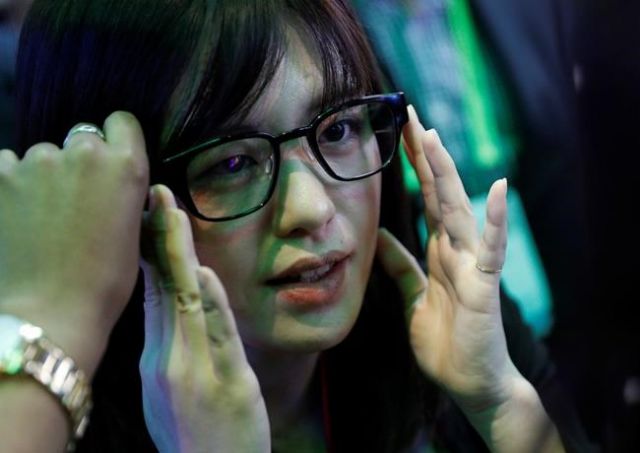The CES 2019 gadget show is revving up in Las Vegas. Here are the latest findings and observations from Associated Press reporters on the ground.
DING-DONG, THE PEEPHOLE IS RINGING
Ring is giving the old-school peephole a high-tech spin.
The company unveiled a new internet-connected video doorbell that fits into most peepholes. The new device is aimed at apartment dwellers or college students who want a video doorbell, but may not be allowed to install one next to their doors.
Amazon bought Ring last year, giving it a shot at competing better with Google’s Nest, which also makes cameras and doorbells. Privacy experts have long sounded the alarm on Wi-Fi connected cameras and how video is stored. Amazon recently filed a patent application for a facial-recognition system involving home security cameras, which would allow multiple cameras to create composites of faces to identify people who may be trying to burglarize a house. It doesn’t appear Ring uses facial recognition yet, as Nest already does, though Ring may add such features over time. Amazon did not respond to a request for comment.
Ring’s Door View Cam will go on sale in March for $199. Ring’s new device will still act as a peephole, but will also send alerts to user’s smartphones when the doorbell is pressed or someone knocks the door.
EYE OF THE BEHOLDER?
The makers of a robotic “personal massager” for women won a prestigious CES award. Then organizers took it away.
Its maker, the startup Lora DiCarlo, was also banned from exhibiting on the show floor (though it’s in Las Vegas at a separate media event).
The show’s organizer, the Consumer Technology Association, said in an email to Lora DiCarlo that it reserved the right to disqualify any entry “deemed by CTA in their sole discretion to be immoral, obscene, indecent, profane or not in keeping with CTA’s image.”
An independent panel of judges had selected Lora DiCarlo’s Ose vibrator last fall to win a CES 2019 Innovation Honoree Award in the robotics and drone category. Gary Shapiro, CTA’s president and CEO, apologized in a separate letter and said the company should have been told it’s “ineligible for entry.” CTA declined to provide further comment to The Associated Press on why the product was ineligible.
Ose’s makers say it’s sexism, noting that “a literal sex doll for men launched on the floor at CES in 2018.” Lora Haddock, the CEO of Lora DiCarlo, says that makes for a double standard at the tech show already under fire for not including enough women.
SHADES THAT TEXT
Smart glasses haven’t been a hit, but at least one startup still sees them in our future.
A company called North will be delivering its $999 smart glasses to customers in the coming weeks. Called Focals by North, they pair with a smartphone and show text messages, weather and mapping directions on the glass that only the wearer sees.
Users also need to wear a ring with a joystick on their index finger, so they can flip through messages or respond with their thumb. It can also be controlled using the built-in Amazon Alexa voice assistant, but the joystick has to be pressed down for it to start listening.
Getting people to buy smart glasses has been a challenge — Google famously stopped selling its smart glasses to the public about four years ago.
Aaron Grant, North’s co-founder, says his product is different because they are designed to look like regular frames. And prescription lenses can be added.
But there’s a small projector on one side, and the frames on the side are slightly thicker.
FRESH BREAD, NO BAKER
That smell wafting through the CES show? Freshly baked bread.
Wilkinson Baking Co. unveiled a 22-square-foot machine that can bake 10 loaves of bread every hour — no baker needed. But a human is needed to dump the ingredients into the machine, which then mixes them, forms the dough and starts baking. Someone also needs to slice the bread, although the company says it’s working on a way for the machines to do that, too.
The BreadBot, as it’s called, is being pitched to supermarkets as a way to deliver fresh bread to shoppers who are increasingly worried about the ingredients in their foods. The machine is covered in glass, so customers can watch bread get made. They then select the loaf they want on a touch screen, sort of like a vending machine.
Three local supermarkets are already testing it. The company says a couple of big chains have agreed to try it out soon, but it won’t say which.
SMART BRA
Is your bra dumb? An underwear company is pitching a solution to an age-old problem for women: finding a bra that actually fits.
In the past, women could get help from an expert human in finding their right size. A simple measuring tape wouldn’t do, as it doesn’t reflect other factors such as the shape of a woman’s breasts. But these old-school “bra fitters” are hard to find these days.
To address that, a company called Soma has added some circuits to a brassiere and connected it to an app.
The Soma Innofit has four lines of circuitry hooked up to a circuit board in the back, which then connects to an app via Bluetooth. The smart $59 bra then recommends a bra — from Soma’s line, of course.
The smart bra isn’t meant for regular wearing, though it could be used again if sizes change because of pregnancy or other factors. The company says people who don’t want to buy one can use it at a Soma store.

